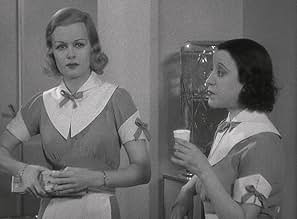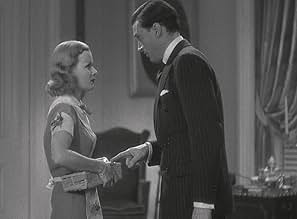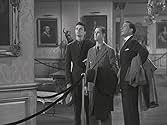La sfacciata manicure Eve Fallon viene reclutata come giornalista ancora più sfacciata e aiuta il fidanzato detective della polizia Danny Barr a smantellare un'organizzazione di furti di gio... Leggi tuttoLa sfacciata manicure Eve Fallon viene reclutata come giornalista ancora più sfacciata e aiuta il fidanzato detective della polizia Danny Barr a smantellare un'organizzazione di furti di gioielli e a risolvere l'omicidio di un neonato.La sfacciata manicure Eve Fallon viene reclutata come giornalista ancora più sfacciata e aiuta il fidanzato detective della polizia Danny Barr a smantellare un'organizzazione di furti di gioielli e a risolvere l'omicidio di un neonato.
- Regia
- Sceneggiatura
- Star
- Premi
- 2 vittorie totali
- Don Butler
- (as Henry Kleinbach)
- Elevator Operator
- (non citato nei titoli originali)
- Customer
- (non citato nei titoli originali)
- Manicurist
- (non citato nei titoli originali)
- Customer
- (non citato nei titoli originali)
- Man Exiting Elevator
- (non citato nei titoli originali)
Recensioni in evidenza
Well, the big brown eyes that come to mind here belong to Cary Grant, who is coming into his own here. You'll recognize not only the looks (the eyes are heavier in the earlier films) but a mature attitude, the relaxed and cocky and sarcastic fellow that is so famous.
The leading woman is Joan Bennett, who plays Grant's love interest. Bennett is not well known as a type the way Crawford or other women from her period are, and it's partly because she plays a kind of generic character, in this case a blond, sweet, smart, fun woman. She actually became more famous later in a couple Fritz Lang dramas (as a brunette), also playing a type. what she had going for her was a natural and fluid ease before the camera. And an ability to fit a part, not steal the show.
Because the show belongs to Grant. And Grant here is a cop, Danny Barr. He tends to insert his casual confidence and slow ease as a cop and it's actually a pretty interesting fit, not at all the stereotype created by harder boiled types, or more witty ones (name a half a dozen famous ones). It's fascinating to watch him at this pivotal point in his career. It's usually pointed out that Grant's persona solidified in 1937 in "The Awful Truth" but having watched most of these films from this period it really seems that he's fully himself here, a year earlier. History is right in the sense that "The Awful Truth" pushed Grant's career up a notch simply because it's a better movie. And he has a more prominent role in it.
Here, the action is spread between Grant and his cops, Bennett and her life bouncing from being a manicurist to a reporter, and the "bad guys" who are up to their usual no good. These thugs are actually pretty convincing, falling short of the hardened awful types of some movies. One of them (the kingpin) is a young Walter Pidgeon, who is not quite right in his role, but it's fun to see him so early in his career.
"Big Brown Eyes" is poorly name, but besides that it's not a bad movie at all, and if you follow the several plot lines (all connected) it gets pretty interesting. Every now and then when the plot is sped up (thankfully) the camera shows a whole range of characters close up and at a tilt. It's both affected (a little at odds with the rest of the movie) and successful (at speeding up the plot with appropriate humor and agitation). There are some fun twists (like when Bennett accidentally makes a fingerprint dusting using some talcum powder. And there are lots of turns, people quitting jobs and leaving town, and some odd shocks, as when the baby is killed.
In the end it's also a romance with Grant in the lead role, well done and sharply acted. See it.
Joan Bennett played the kind of sassy brassy part that was often taken on by the likes of Ginger Rogers or Joan Blondell. Did anyone else catch her throwaway line that mirrored Mae West's famous "come up and see me sometime?" Many folks don't remember that Bennett was a blond BEFORE she became better known to later movie audiences as a brunette. Does anyone know of any other famous actress who made such a transition? Not me.
The rest of the cast did serviceable work in the film. Douglas Fowley, who played a humorous bit as one of the crooks, is far better known to most film audiences as the harried movie director in "Singing in the Rain," who had to deal with the chaotic and riotous problems of bringing sound to what were formerly silent movies.
But this film belongs to its male lead. You can almost see in watching the movies he made at this time just how he developed the layers of "business" that came together to produce the screen personality we all know as Cary Grant. He may have been paying his dues by taking on this fairly routine role. In the long run----we are all the better for it. Cary Grant was one of the greatest screen actors of all time----maybe the greatest.
As for Joan, though much of the film I thought she was her sister Constance, as Joan died her hair platinum blonde for the film and she's best known as a raven-haired actress. It's amazing how much alike they look given the same hair styles. She, too, had better and more popular films in the future and so this film is one from both their transitional periods--clearly they were stars, but not of the first order.
The film is a wonderful blend of comedy, romance and mystery and is one of the better examples of this odd genre combination. While it isn't up to the tip-top standards of THE THIN MAN (but what was?), it was certainly a very good film. What I liked best was the writing for Joan's character. She was a wonderful 'broad'--a worldly and wise lady who had some of the best one-liners I've ever heard in a film of the era. She was enticing AND mouthy at the same time--whatta dame! The mystery involves an evil private detective (Walter Pidgeon) who is not above a lot of larceny in order to make it in his racket. Not only does he find stolen items, but he's not above having others killed or dealing with crooks to get it. During most of the film, Grant plays a police detective (an odd casting decision, I know) who is in love with Joan AND is assigned to a case involving Pidgeon--though at this point, no one knows he's "Mr. Big" behind everything evil and corrupt Grant is investigating. Throughout the investigation, Joan in the role of a reporter, does amazingly well in helping her boyfriend and even though they snipe at each other a bit, they are a great screen couple.
Overall, a delightful film that is close to earning an 8. Very well written and surprisingly good for an earlier Grant film.
Lo sapevi?
- QuizAt 20 minutes, Eve Fallon (Joan Bennett) says to Danny Barr (Cary Grant), with a flirtatious wink, "if you happen to be around my way, come up and see me some time". This appears to refer to a famous, almost identical line said by Mae West to Cary Grant in "She Done Him Wrong" (1933), a playful in-joke that would have been obvious to contemporary audiences.
- Citazioni
Richard Morey: Cortig, if you bought a gift for a girl and she refused to accept it, what would you do?
Russ Cortig: [with a slow smile] I'd give it to my wife.
- ConnessioniFeatured in The True Adventures of Raoul Walsh (2014)
I più visti
- How long is Big Brown Eyes?Powered by Alexa
Dettagli
- Tempo di esecuzione1 ora 17 minuti
- Colore
- Proporzioni
- 1.37 : 1
Contribuisci a questa pagina


































